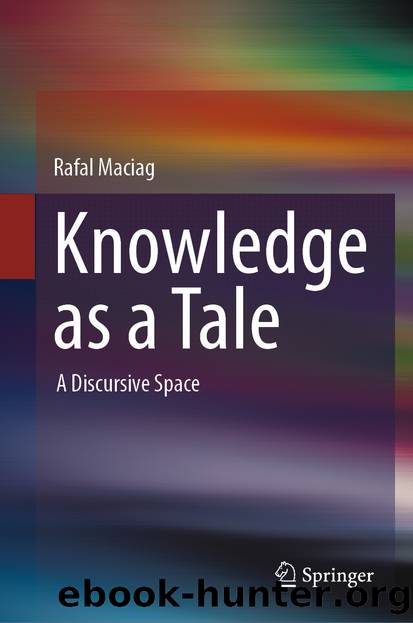Knowledge as a Tale: A Discursive Space by Rafal Maciag

Author:Rafal Maciag [Maciag, Rafal]
Language: eng
Format: epub
Tags: Science, Philosophy & Social Aspects, Technology & Engineering, General, Mathematics, History & Philosophy, Computers, Social Aspects, Philosophy
ISBN: 9783031698194
Google: hczS0AEACAAJ
Publisher: Springer Nature Switzerland
Published: 2024-10-17T05:00:00+00:00
Eco writes about any work of art, not just literary works. Yet, the scholar remained close to the literary domain all his life, both as a theorist and as an authorâthe author of many well-known novels and short stories. Text is definitely where he feels most at home, and it is from the windows of this home that one can best see the distant landscapes of the other arts and sciences. What he writes about the work of art is a story alsoâor perhaps mainlyâabout literature, as his later books, such as the aforementioned Lector in fabula, prove. But the broader perspective, encompassing all art, is important because it supports the dynamics of the work of artâs existence which he describes and which is of such great significance here. A work of art, he writes, is an object composed for its audience. This definition makes it a very broad category. A work of art happens between people in such a way that impulses flow from it towards the recipient and encounter the sensitivity and intelligence of the latter, producing themselves anew each time in this extraordinary act. Itâs a universal process that occurs whenever a situation fulfills these very general conditions. Of course, it is now only a step away from a very general understanding of a work of art, which is actually the everyday, which was a separate discovery of twentieth-century art. In light of the reasoning discussed here, the most important thing is to introduce the viewer to the process of a work of artâs coming to being. From now on, no sculpture, no piece of music, no text can be treated as artifacts that are independent, complete, and exhaustive in all of their qualities. Although this thought, this premonition, appears in a number of reflections, Eco expressed it with particular emphasis. This, of course, is also a deformation of some common idea of the object and its way of being.
Itâs a strange event that destroys the independence, the sovereignty of an object, usually considered so far as exceptionalâafter all, a work of art seems to be exactly so. It takes away its exclusive existence, tearing down, in fact, its ontological foundations in the process. Ecoâs examination of this event continues in Lector in fabula, which he writes already as a semiologist. The book focuses exclusively on text, with the artistic context of its origins becoming weakerâor abandoned altogether. This is understandable because the intention of the author (creator) loses its significance since their work comes to being on the basis of a universal mechanism that always worksânot only when the author is an artist. Eco begins his argument with the familiar and very good known observation that âil testo é una macchina pigra che esige dal lettore un fiero lavoro cooperative per riempire spazi di non-detto o di giá-detto rimasti per così dire in bianco, allora il testo altro non e che una macchina presuppositionaleâ (Eco 1979, 26) (âthe text is a lazy machine that demands from
Download
This site does not store any files on its server. We only index and link to content provided by other sites. Please contact the content providers to delete copyright contents if any and email us, we'll remove relevant links or contents immediately.
The Mikado Method by Ola Ellnestam Daniel Brolund(23444)
Hello! Python by Anthony Briggs(22581)
Secrets of the JavaScript Ninja by John Resig Bear Bibeault(21376)
Kotlin in Action by Dmitry Jemerov(20427)
Dependency Injection in .NET by Mark Seemann(20380)
The Well-Grounded Java Developer by Benjamin J. Evans Martijn Verburg(20264)
OCA Java SE 8 Programmer I Certification Guide by Mala Gupta(19442)
Algorithms of the Intelligent Web by Haralambos Marmanis;Dmitry Babenko(18251)
Grails in Action by Glen Smith Peter Ledbrook(17374)
Adobe Camera Raw For Digital Photographers Only by Rob Sheppard(16973)
Sass and Compass in Action by Wynn Netherland Nathan Weizenbaum Chris Eppstein Brandon Mathis(14803)
Secrets of the JavaScript Ninja by John Resig & Bear Bibeault(12769)
Test-Driven iOS Development with Swift 4 by Dominik Hauser(11207)
A Developer's Guide to Building Resilient Cloud Applications with Azure by Hamida Rebai Trabelsi(10598)
Jquery UI in Action : Master the concepts Of Jquery UI: A Step By Step Approach by ANMOL GOYAL(10440)
Hit Refresh by Satya Nadella(9128)
The Kubernetes Operator Framework Book by Michael Dame(8544)
Exploring Deepfakes by Bryan Lyon and Matt Tora(8370)
Robo-Advisor with Python by Aki Ranin(8314)
